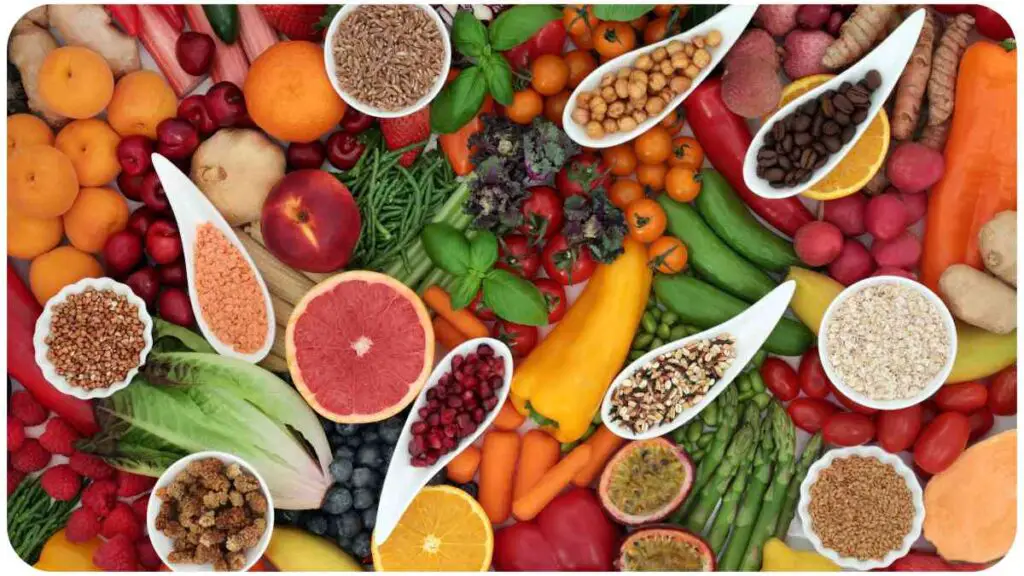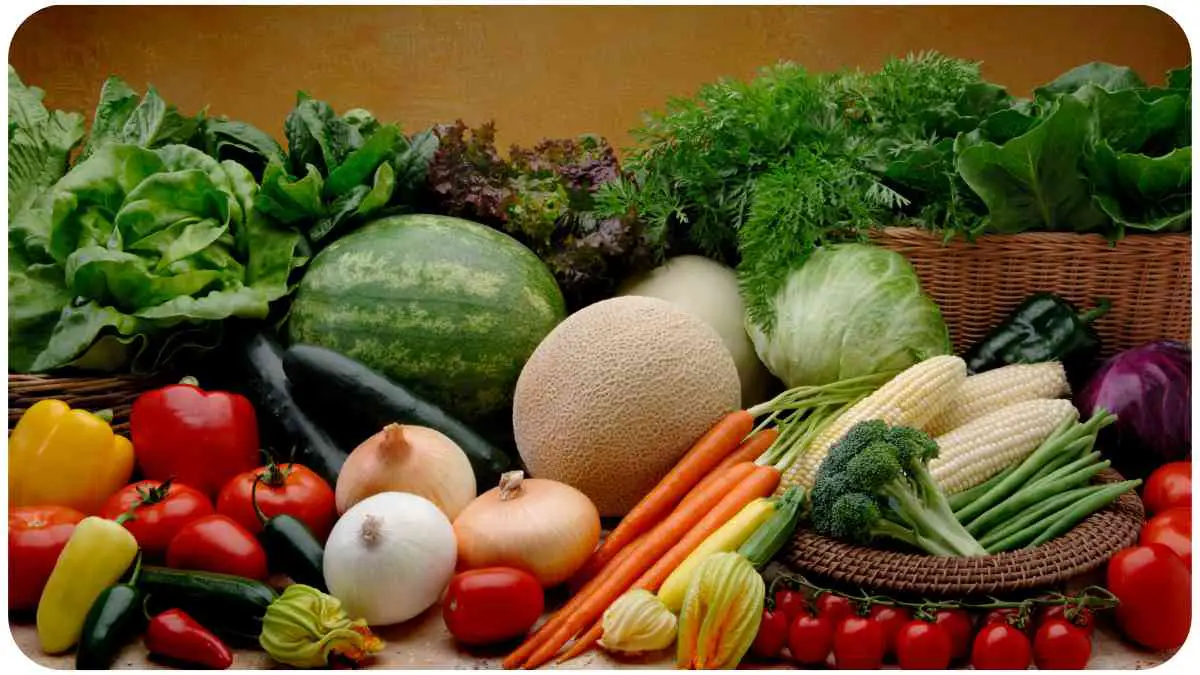As more people embrace a plant-based lifestyle, questions arise about the authenticity of vegan produce. Are all fruits and vegetables truly plant-powered, or is there more to the story?
In this comprehensive guide, we will decode the world of vegan produce, exploring the nutritional aspects, environmental impact, and potential pitfalls in the plant-powered journey.
| Takeaways |
|---|
| 1. Vegetarian Diets Decoded: Gain clarity on vegetarian diets, debunking common misconceptions, and finding guidance for a well-informed plant-based lifestyle. |
| 2. Insights into Plant-Based Diets: Delve deeper into the world of plant-based diets, understanding the nuances and benefits of embracing a diet centered around fruits, vegetables, and plant-derived foods. |
| 3. Unraveling Meatless Diet Terminology: Decode the language around meatless diets, clarifying concepts like vegetarian, vegan, raw, and plant-based for a better understanding of the terminology. |
| 4. Identifying Vegan-Friendly Additives: Learn how to identify non-vegan additives in processed foods, empowering you to make conscious choices and avoid unintentional non-vegan consumption. |
| 5. Nutritional Sufficiency of Vegan Diets: Understand that a well-planned vegan diet can be nutritionally sufficient, providing all necessary nutrients. Consulting with a registered dietitian ensures a balanced and healthy plant-based diet. |
| 6. Overcoming Social Challenges for Vegans: Navigate challenges in social situations for vegans, including dining out and attending gatherings, by planning ahead, communicating preferences, and bringing vegan dishes. |
| 7. Environmental Impact of Vegan Diets: Recognize the lower environmental impact of vegan diets, contributing to reduced greenhouse gas emissions, land usage, and water consumption compared to non-vegan diets. |
2. What Makes a Food Truly Vegan?
2.1 Understanding Plant-Based Diets
Before we delve into the specifics, let’s clarify what it means for a food item to be truly vegan. Plant-based diets primarily consist of fruits, vegetables, grains, nuts, and seeds, excluding any animal products or by-products.
Dive into the nuances of vegan vs. plant-based lifestyles, gaining a deeper understanding of dietary choices and their impact on the environment and personal well-being.
2.2 The Vegan Lifestyle and Food Choices

Being vegan is not just about the food on your plate; it extends to lifestyle choices. This includes opting for cruelty-free products and advocating for animal welfare. Now, let’s explore the journey of plant-powered nutrition.
3. The Plant-Powered Journey
3.1 Exploring Fruits
Fruits are a cornerstone of a vegan diet, providing essential vitamins, minerals, and antioxidants. Let’s compare the nutritional profiles of common fruits in the table below.
Table: Nutritional Comparison of Common Fruits
| Fruit | Calories | Vitamin C (mg) | Fiber (g) | Antioxidants (ORAC) |
|---|---|---|---|---|
| Apple | 95 | 0.5 | 4 | 2,828 |
| Banana | 105 | 10.3 | 3.1 | 2,654 |
| Blueberries | 84 | 9.7 | 3.6 | 9,019 |
| Orange | 62 | 69.7 | 3.1 | 2,103 |
3.2 Diving into Vegetables
Vegetables contribute crucial nutrients to a vegan diet. The table below highlights the essential vitamins found in different vegetables.
Explore the intricacies of the vegan food pyramid, especially tailored for athletes, uncovering essential plant-powered nutrients crucial for a balanced and sustainable vegan diet.
Table: Essential Vitamins in Different Vegetables
| Vegetable | Vitamin A (IU) | Vitamin K (mcg) | Vitamin B6 (mg) | Vitamin C (mg) |
|---|---|---|---|---|
| Spinach | 469 | 145 | 0.2 | 47.7 |
| Carrot | 16,705 | 16.9 | 0.1 | 7.6 |
| Broccoli | 567 | 92.5 | 0.2 | 81.2 |
| Bell Pepper | 372 | 5.7 | 0.2 | 152 |
These tables offer insights into the diverse nutritional benefits of plant-based foods, aiding your journey into veganism. In the next section, we’ll explore the nuances of organic vs. conventional produce and their impact on the vegan lifestyle.
4. Organic vs. Conventional Produce
4.1 The Impact on Veganism
While both organic and conventional produce can be part of a vegan diet, the choice between the two can impact your health and the environment. Let’s analyze the presence of pesticide residues in organic and conventional produce in the table below.
Discover sustainable fashion with insights on vegan leather care, ensuring long-lasting style while embracing cruelty-free alternatives in your wardrobe.
Table: Pesticide Residue in Organic vs. Conventional Produce
| Produce | Organic Pesticide Residue (%) | Conventional Pesticide Residue (%) |
|---|---|---|
| Apples | 3.4 | 75.4 |
| Spinach | 1.6 | 83.5 |
| Strawberries | 2.8 | 91.0 |
| Tomatoes | 4.2 | 63.8 |
Understanding the difference in pesticide residue levels can guide your choices for a more conscious and sustainable vegan lifestyle.
5. Hidden Non-Vegan Elements in Produce
5.1 Surprising Additives and Processes
While fruits and vegetables are inherently vegan, processed foods can introduce non-vegan elements. Let’s uncover some common additives and processes that might surprise you in the table below.
Table: Common Non-Vegan Additives in Processed Foods
| Additive | Source |
|---|---|
| Gelatin | Animal bones and connective tissues |
| Carmine (E120) | Crushed female cochineal insects |
| L-cysteine | Often derived from duck feathers |
| Whey | Dairy by-product |
Being aware of these additives can help you make informed choices and avoid unintentional non-vegan consumption.
6. Veganism and Environmental Sustainability

6.1 The Ecological Footprint of Plant-Based Diets
Beyond personal health, veganism aligns with environmental sustainability. Let’s explore the ecological footprint of animal-based versus plant-based diets in the table below.
Delve into the discussion on how going vegan helps the environment, exploring the sustainable choices that contribute to a healthier planet and a compassionate lifestyle.
Table: Environmental Impact of Animal-Based vs. Plant-Based Diets
| Metric | Animal-Based Diet | Plant-Based Diet |
|---|---|---|
| Greenhouse Gas Emissions (kg CO2) | 7,000 | 2,000 |
| Land Usage (sq. meters/year) | 18 | 3 |
| Water Footprint (liters/day) | 5,000 | 1,500 |
Adopting a plant-based diet can significantly reduce your environmental impact, contributing to a more sustainable future.
7. Common Misconceptions about Vegan Produce
7.1 Debunking Myths and Clarifying Facts
Misconceptions surrounding vegan produce can deter individuals from embracing this lifestyle. Let’s dispel some common myths in the table below.
Table: Nutrient Comparison Between Vegan and Non-Vegan Diets
| Nutrient | Vegan Sources | Non-Vegan Sources |
|---|---|---|
| Protein | Legumes, tofu, nuts, seeds | Meat, dairy products |
| Calcium | Kale, broccoli, fortified foods | Dairy products |
| Omega-3 Fatty Acids | Flaxseeds, chia seeds, walnuts | Fish, fish oil |
| Iron | Lentils, beans, spinach | Red meat, poultry |
Understanding the nutrient sources in vegan diets helps dispel myths and ensures a well-balanced nutritional intake.
8. How to Ensure Your Produce is Truly Vegan
8.1 Tips for Conscious Shopping
Ensuring that your produce is genuinely vegan requires conscious decision-making. Here are some practical tips for identifying vegan-friendly products:
Navigate the culinary landscape with tips on ensuring veggie bread authenticity, ensuring your loaf aligns with true vegan principles for a conscientious and plant-powered dining experience.
Table: Guide to Identifying Vegan-Friendly Products
| Tip | Description |
|---|---|
| Check ingredient lists | Scan for animal-derived ingredients like gelatin, honey, and certain colorings. |
| Look for vegan labels | Many products now carry vegan certification logos, making it easier for consumers to make informed choices. |
| Choose whole foods | Opt for fresh fruits, vegetables, grains, nuts, and seeds to minimize the risk of hidden non-vegan elements. |
| Explore plant-based alternatives | Embrace the growing market of plant-based alternatives for dairy, meat, and other traditionally animal-based products. |
Following these guidelines empowers you to make informed choices, ensuring that your vegan journey stays true to its principles.
9. Creative Vegan Recipes
9.1 Turning Plant-Powered Ingredients into Delightful Meals
Transitioning to a vegan lifestyle doesn’t mean sacrificing taste. Here are some quick and tasty vegan recipes to inspire your culinary adventures:
Table: Quick and Tasty Vegan Recipes
| Recipe | Ingredients | Instructions |
|---|---|---|
| Chickpea Buddha Bowl | Chickpeas, quinoa, kale, avocado, tahini | Cook quinoa, roast chickpeas, sauté kale, assemble in a bowl, drizzle with tahini, top with avocado. |
| Lentil Tacos | Lentils, taco shells, salsa, avocado | Cook lentils with taco seasoning, fill taco shells, top with salsa and sliced avocado. |
| Vegan Stir-Fry | Tofu, broccoli, bell peppers, soy sauce | Sauté tofu and vegetables, add soy sauce, serve over rice or noodles. |
| Vegan Chocolate Avocado Mousse | Avocado, cocoa powder, maple syrup, vanilla extract | Blend ingredients until smooth, refrigerate, and enjoy a rich, dairy-free chocolate mousse. |
These recipes showcase the versatility and deliciousness of plant-powered ingredients.
10. Overcoming Challenges on a Vegan Diet
10.1 Navigating Social Situations and Dietary Restrictions
Embarking on a vegan journey comes with its challenges, especially in social settings. Let’s explore common challenges and practical solutions in the table below.
Table: Common Challenges and Solutions for Vegans
| Challenge | Solution |
|---|---|
| Dining out | Research vegan-friendly restaurants, communicate dietary preferences to staff, or offer to customize dishes. |
| Social gatherings | Bring a vegan dish to share, or eat beforehand and focus on socializing. |
| Nutritional concerns | Consult with a registered dietitian to ensure a balanced and nutrient-rich vegan diet. |
| Family and peer pressure | Educate others about veganism, share your reasons, and lead by example. |
Navigating these challenges can contribute to a smoother transition to a vegan lifestyle.
11. Personal Stories from Prominent Vegans
11.1 Insights from Influencers and Experts
Learning from the experiences of others can provide valuable insights and motivation on your vegan journey. Here are some success stories and lessons learned from prominent vegans:
Table: Success Stories and Lessons Learned
| Influencer/Expert | Success Story | Key Lessons |
|---|---|---|
| Brenda Davis | Overcame health issues with a plant-based diet | Emphasizes the importance of a well-balanced vegan diet for optimal health. |
| Rich Roll | Ultra-endurance athlete transformed by veganism | Demonstrates that a plant-based diet can fuel high-performance activities. |
| Earthling Ed | Advocate for animal rights and ethical veganism | Highlights the ethical considerations behind veganism and the impact on animal welfare. |
| Tabitha Brown | Actress and vegan influencer | Encourages a positive and joyful approach to veganism, focusing on delicious plant-based meals. |
These stories showcase the diverse paths individuals have taken towards veganism, proving that there is no one-size-fits-all approach.
12. The Future of Veganism and Agriculture

12.1 Innovations and Trends
As veganism continues to gain traction, the future holds exciting developments in plant-based agriculture. Let’s explore emerging technologies in the table below:
Table: Emerging Technologies in Plant-Based Agriculture
| Innovation | Description |
|---|---|
| Plant-Based Meat Alternatives | Advancements in creating meat-like textures and flavors from plant sources. |
| Vertical Farming | Sustainable, space-efficient farming methods to address land scarcity. |
| Cellular Agriculture | Lab-grown meat and dairy products as an alternative to traditional farming. |
These innovations signify a shift towards more sustainable and cruelty-free agricultural practices, shaping the future of food.
13. Conclusion
Decoding vegan produce involves understanding the nutritional aspects, environmental impact, and potential challenges in the plant-powered journey. By exploring the intricacies of fruits, vegetables, and processed foods, we’ve unveiled the truth behind veganism.
As you embark on or continue your vegan journey, remember that it’s a personal and evolving experience. Stay informed, enjoy the variety of plant-powered foods, and connect with the thriving vegan community. Whether for health, ethics, or the environment, your choice contributes to a more compassionate and sustainable world.
15. FAQs on Vegan Produce
Q1: Can a vegan diet provide all necessary nutrients?
Yes, a well-planned vegan diet can meet all nutritional needs. It’s crucial to include a variety of fruits, vegetables, grains, nuts, and seeds to ensure adequate intake of essential nutrients.
Q2: How can I identify vegan-friendly products?
Check ingredient lists for animal-derived components, look for vegan labels, opt for whole foods, and explore plant-based alternatives for traditional animal-based products.
Q3: Is veganism only about food?
No, veganism extends beyond diet to lifestyle choices. It includes avoiding products made from or tested on animals, promoting cruelty-free practices, and advocating for animal welfare.
Q4: What are some common challenges for vegans?
Common challenges include dining out, social gatherings, nutritional concerns, and dealing with family and peer pressure. Solutions involve planning ahead, communication, and education.
Further Reading
- Confused About Vegetarian Diets? We Got You Covered!: This blog provides comprehensive insights into vegetarian diets, addressing common misconceptions and offering guidance for those navigating plant-based lifestyles.
- Understanding Plant-Based Diets: Dive deeper into the world of plant-based diets with this resource, exploring the nuances and benefits of embracing a diet centered around fruits, vegetables, and other plant-derived foods.
- Decoding the Language Around Meatless Diets: This article helps unravel the terminology associated with meatless diets, providing clarity on concepts like vegetarian, vegan, raw, and plant-based.
FAQs
Are all fruits and vegetables suitable for a vegan diet?
Yes, all fruits and vegetables are inherently vegan. They form the foundation of a plant-based diet, providing essential nutrients without the need for animal products.
How can I identify non-vegan additives in processed foods?
Check ingredient lists for additives like gelatin, carmine, L-cysteine, and whey, which are derived from animal sources. Opting for whole, unprocessed foods minimizes the risk of non-vegan additives.
Is a vegan diet nutritionally sufficient?
A well-planned vegan diet can be nutritionally sufficient, providing all necessary nutrients. Consulting with a registered dietitian can ensure a balanced and healthy plant-based diet.
What are some challenges in social situations for vegans?
Vegans may face challenges when dining out or attending social gatherings. Planning ahead, communicating dietary preferences, and bringing vegan dishes can help overcome these challenges.
How does the environmental impact of vegan diets compared to non-vegan diets?
Vegan diets generally have a lower environmental impact, contributing to reduced greenhouse gas emissions, land usage, and water consumption compared to non-vegan diets.

Hi! My name is Hellen James, and I’m a vegan lifestyle enthusiast. I’ve been living the vegan lifestyle for over 10 years now, and it’s been one of the best decisions I’ve ever made. The food is amazing, the community is incredible, and there’s no way I could go back after experiencing all this firsthand.

